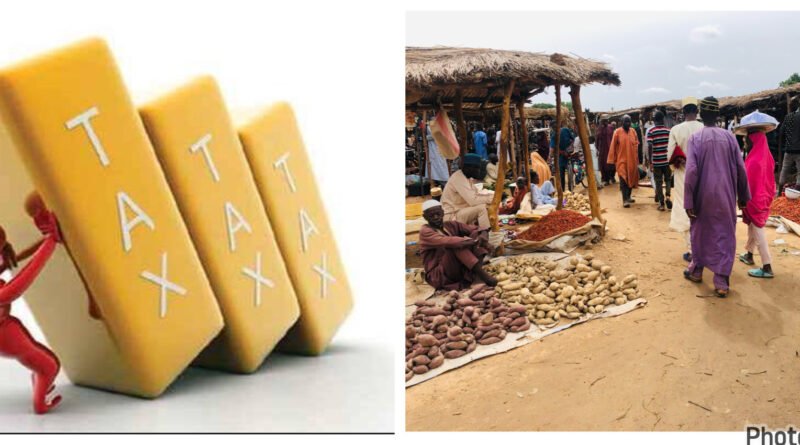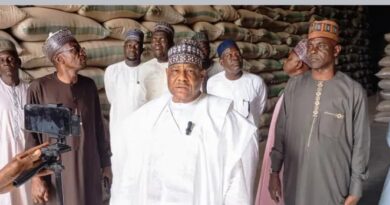Despite Gov’t Policy, Multiple Taxes Are Hurting the Informal Sector in Kano State
By Mustapha Salisu
In Kano State, despite the presence of the ‘Kano State & Local Government Revenue Administration (Consolidation & Codification Law, 2021) which seeks to harmonize all revenue laws, including Local Government taxes, the issue of multiple taxation in some markets persists. Mustapha Salisu reports.
Auwal Salisu, a young man in his mid-30s shared his frustration over the numerous taxes he has to pay for his textile business at Kantin Kwari Textile Market in Kano, the ancient capital city of Kano State. He explained some of the various taxes and fees to this reporter.
“First, the state government gives you a notice period of one to two months, depending on the circumstances. When it’s time to pay, you have two options: pay as a group or as an individual. In either case, you’ll get a receipt,” Salisu said. According to him, they bargain with the revenue collectors and it ranges between N20,000 to N50,000 or more annually.
“Secondly, the local government follows the same notice and payment strategy as the state government, with prices varying.” The tax paid the local government is referred to sanitation and shop rate, summing up to N50,000 annually.
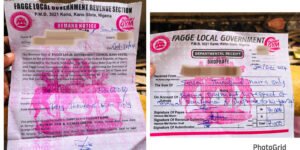
“Then, there’s the market union. Sometimes, unknown individuals come to your shop, claiming to be tax collectors from the market union. They say their office is different from the Managing Director’s and present you with another levy to pay.”
“Another batch of tax collector will come, claiming to be from the office of the Managing Director of Kwari Market, asking for additional taxes in the name of security and sanitation.”
Salisu continued, “There’s also a shop ownership fee. If the owner doesn’t pay, they lock the shop despite all the taxes we are paying. If we complain, they tell us to find the shop owner.”
He emphasized that the same security and sanitation fees often appear in local government and market union taxes, and sometimes, no receipt is issued from the MD’s office, leading to conflicts when another batch of tax collector arrives.
What is Tax & Multiple Taxation?
The National Tax Policy has defined tax as the monetary charge imposed by the government on persons, entities, transactions, or properties to yield revenue for government to run its operation.
Multiple taxation is said to occur where these taxes, fees, and rates are levied on the same person in respect of the same liability by more than one tax authority – state, local council, union or other entities. It is also seen in the various unlawful compulsory payments being collected by the local and state governments without appropriate legal backing through intimidation and harassment of the payers which is characterized by the use of stickers, mounting of roadblocks, use of revenue agents/consultants, including motor park touts. It also refers to situations where a taxpayer is faced with demands from two or more different levels of government either for the same or similar taxes.
This can lead to a significant increase in the overall tax burden, potentially discouraging economic activity and investment.
Kano’s Consolidation & Codification Law, 2021 on Tax
In Kano State, there is the Kano State & Local Government Revenue Administration (Consolidation & Codification Law, 2021) which was signed into law in December 2022 by former Governor Abdullahi Umar Ganduje.
The law seeks to harmonize all revenue laws in the state, including local government tax laws. With the establishment of the Kano Internal Revenue Service (KIRS), the agency has the sole authority for the assessment, collection and accounting of all revenue in the state (tax & non-tax).
Part 6, Section 29 (a) and (b) of the law clearly spells out harmonization of tax administration in the state under the functions of the state and local government joint revenue. Including Enlightening members of the public generally on state and local government revenue matters. It details the responsibilities of the state and local government Joint Revenue Committee, including the important role of educating the public on matters related to state and council revenue. This provision is designed to ensure that tax administration is consistent and transparent across the state. Unfortunately, lack of proper implementation of the ‘Consolidation & Codification Law, 2021’ has given room for multiple taxation.
Also, some taxpayers do not know about the law, they only pay the tax whenever they are approached to pay.
Muhammad Bello, who sells dates from his wheelbarrow at the popular Wudil Market which booms every Friday of the week, faces double taxation: N50 weekly to the local government at Wudil Market and another N50 to the nearby Kara cattle market.
“Why can’t they harmonize these taxes?” he questions, pointing out that a mere road that divides the markets.
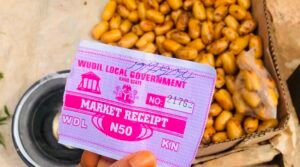
“We don’t even know who receives our payments,” Muhammad laments. “Whether local officials, state agents, or market intermediaries, we pay just to keep working” he said
Curiously, even Muhammd does not know who exactly he pays to. According to him, the tax collectors parade themselves as government agents and he pays to anyone that approaches him without asking them of their jurisdiction or affiliation, which leaves room for non-state actors to exploit the situation to collect unlawful levies and taxes.
A vendor, Abubakar Buyage, who sells woven hats, mats, and hand fans at the Wudil Market, sheds light on the fragmented tax system.
At every sales stage, the tax collector collects levy of the buyer and also seller for the same commodity, there’s a levy: N50 here, N100 there to the Local Government” he explains.
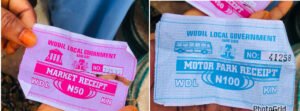
When asked by this reporter about accountability for their contributions, Abubakar said in Hausa language: “Ba mu da wannan hanyar,” which translates to “we don’t have the means,” expressing their inability to monitor tax usage.
“If we question, it invites trouble. They’re powerful; we’re not,” he concluded.
We Don’t See the Impact the Multiple Taxes that we Pay
Some aggrieved marketers during an interaction with this reporter expressed their frustrations over paying multiple taxes without seeing its impact when the need arises in their various markets.
According to Auwal Salisu in Kantin Kwari Market “The painful part is that we don’t see the impact of these fees. I pay a young boy N500 weekly to clean my shop premises. Also, some people claiming to be security men approach us for a security fee, which is N2000
He lamented the lack of a government-owned clinic and adequate restrooms in the large market, forcing them to use facilities at the nearby Beirut Market.
At Lahadi Makole Market in Dawakin Kudu, vendors like Hudu Muhammed, who sells groundnuts, soybeans, and other goods, face a taxing system that starts before they even unload their merchandise. Kudu explained that the tax begins with a fee ranging from N50 to N100 before offloading the goods from the vehicle, especially groundnuts. According to him, both the buyer, seller, and retailer pay taxes on the same groundnut, all to the local government.
“The tax starts from N50 to N100 for offloading each vehicle, but we also have to pay between N20 to N30 per bag, as the case may be,” he said.
For shop owners in Lahadi Makole Market, the local government collects an annual tax between N3,000 to N5,000 depending on the estimated profit, along with a weekly tax of N200. Hudu expressed frustration that despite these tax payments, there are no visible improvements in the market. They face issues like soil erosion, which has affected easy accessibility for vehicles to bring goods to the market.
“If a shop is damaged, there is no intervention from the taxes we pay. We only watch as the roofing and other valuables like doors and windows are taken away by unknown persons if we don’t have the financial power to repair them,” Hudu lamented.
At Wudil Market, Alhaji Shehu Wudil, who sells flour, salt, and sugar, echoed similar frustrations, noting that each year he faithfully pays taxes to both local and state governments. The local government levy amounts to N5,000 annually, while state’s tax ranges between N15,000 to N20,000.
According to Alhaji Shehu “The issue is that despite our prompt tax payments, we see little in return. Especially during the rainy season, when drains clog and refuse piles up, we struggle.”
He pointed toward the market’s infrastructure, where rainwater disrupts open-air vendors and damages government-owned shops.

“No assistance comes our way,” he lamented.
“Even after paying so much in taxes, we’re left to fend for ourselves. Either you fix it or lose your space to someone more influential” he added.
Abubakar Buyage, who sells woven hats, mats, and hand fans at Wudil Market explains that their contributions total N20,000, significant for roadside vendors seeking basic infrastructure like sand-filled grounds to prevent stagnant water.
It was gathered that the traders in the woven hats, mats and hand fans section pay joint tax as Abubakar Buyage, who is the chairman collects the contributions from his members and submits to revenue officers who in turn sends it to the local government.
Significantly, this apparently unorganized and unregulated tax collection system leaves room not only for manipulation but also corruption
“We’ve pleaded endlessly,” Abubakar recounts, “but our cries seem to fall on deaf ears. The water keeps rising, slowly pushing us out of business,” Buyage complained.
Malam Inusa Saleh, Chairman of the Cattle Wing at Lahadi Makole Market, provided insights into the tax system for livestock merchants.
“For every ram brought to the market, there is a tax of N100. Likewise, taking it out incurs a tax of N100, but if you purchase in larger quantities, you won’t be taxed.”
He explained that they generate the tax and pay both the local and state governments.
“For the local government, we pay the money on a weekly basis based on what we generate,” he said.
Saleh appealed to the state government to fence the market, noting that previous administrations had not acted on their numerous appeals.
Market Authorities React
Garba Labo Gano, speaking on behalf of the market chief at Lahadi Makole Market Dawakin Kudu, acknowledged that every week they collect revenue for the local government. However, he noted that issues like soil erosion and other challenges are beyond the capacity of the local government, requiring state government intervention.
“We learned that the state government is ready to intervene in our plight, but you know, administrative bottlenecks slow the process,” he said.
Gano also clarified that they are not mandated to utilise the collected revenue for any tasks without directives from the local government, as they only submit the revenue to the council. Gano failed to disclose the amount they receive either on weekly or monthly basis. However, a trader in the market named Abbas Tudun-Gusau who trades in Cassava told this reporter that roadside vendors pay N50 to N100 weekly while shop owners pay N1,000 monthly to the market union.
For Yahaya Aliyu who spoke on behalf of a tax collector known as Baba Shugaba, who was appointed by the market union in Wudil Market, who operates under the jurisdiction of the market emirate established by the local government, he confirmed that all collected funds are remitted to the local government.
Responding to claims made by sellers of woven hats, mats, and hand fans that multiple fees are imposed at different stages of goods transactions, Mallam Aliyu vehemently denied this allegation.
When asked about the accountability of the collected funds and whether they are effectively utilised to meet community needs, he expressed some frustration in that regard. Despite presenting demands to the local government, he claims, little or no action is taken.
In Hausa, he reflects, “Bin na Gaba, Bin Allah,” meaning obedience to leaders is akin to obeying Allah’s commands.
On his part, the Managing Director of Kantin Kwari Market, Alh. Hamisu Sa’ad Dogon Nama, refuted claims of multiple taxation there. He clarified that the market does not collect taxes from traders.
“What we collect is a service fee for sanitation and security, amounting to N1,000 monthly each,” he stated.
Dogon Nama emphasized that the market regularly educates traders to verify any tax demands they receive.
“If someone approaches you to pay tax, ask what type of tax it is or request to see their tax documents,” he advised. “Even if you do pay, make sure to get a receipt and follow up with the responsible agency to ensure the payment is properly recorded to avoid multiple taxations.”
He further explained, “Our board clearly outlines the services covered by the fee, which are sanitation and security. If you pay, you will be issued a receipt. If you don’t see the impact of these services, you have every right to complain.
“In Kantin Kwari, we have employees who sweep the market from 7 a.m. to 11 a.m., easily identifiable by their uniforms. For those concerned about multiple taxation, we encourage you to question anyone who comes to collect money. Throughout Kantin Kwari, only our board has officially recognized sanitation and security officers,” Dogon Nama noted.
KIRS Speaks on the Consolidation Policy
The Kano State Internal Revenue Service (KIRS), custodians of the Consolidation & Codification Law 2021, as amended in 2022 and 2023, are committed to ensuring efficient revenue collection in the state said Malam Muhammad Abba Aliyu, Executive Director of Compliance and Enforcement at the agency. He explained that the law was established to codify all revenue items collectable by the state government. This aligns with the 52-digit chart of accounts and aims to consolidate revenue sources by encouraging the harmonization of taxes collected by both state and local governments.
“We are implementing all sections of the law to ensure efficiency in revenue collection,” Malam Abba stated.
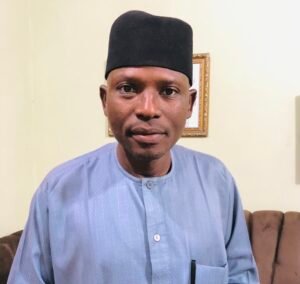
When asked about the implementation level of the policy in Kano State, Malam Abba explained that the state is about 60% along the way. The state government has approved a system known as the Central Billing System (CBS), supported by a platform called Kano Integrated Revenue Management System (KIRMAS).
“The intention is for all revenue-generating sources to adopt this platform, ensuring that taxes collected daily, weekly, monthly, and yearly are reported, monitored, and evaluated according to state revenue laws” he noted.
Addressing the issue of multiple taxation, Malam Abba disclosed that the policy is designed to make tax payments straightforward. Taxpayers will know exactly what they need to pay and can generate their invoices themselves, making payments directly to the state government’s IGR account.
He added, “There are two options: generating an invoice and paying at the bank or paying through transfer, ATM, or Quick Teller.”
Regarding concerns from local traders in Wudil, Lahadi Makole, and Kantin Kwari markets about fragmented multiple taxation and reasons behind harmonization policy is yet to reach them, Abba acknowledged that dealing with local business people is the greatest challenge in Kano State.
“Because of most our teeming populace are the informal business people and you know dealing with informal tax payers is very difficult”
“But we are working hard to educate both the formal and informal sectors on what taxes to pay, when, where, and how to pay them”
“Also, efforts are underway to eradicate cash payments and enhance public engagement to inform, educate, and sensitize taxpayers about the KIRMAS platform” Malam Abba disclosed.
While the Central Billing System (CBS) is not yet fully implemented, Malam Abba assured that once it is, it will streamline the tax payment process. The aim, he said, is to make the payment structure both horizontal (across state MDAs) and vertical (including local government taxes). Once fully implemented, taxpayers will be able to pay all state and local government taxes with a single invoice, splitting payments as necessary.
Regarding penalties for non-compliance, Malam Abba explained that corporate organizations must remit deducted payees by the 10th of the following month or face a penalty of 10% of the prevailing CBN interest rate on the amount. Individuals are required to file their returns within 90 days (January 1st to March 31st each year), with late filings attracting penalties.
The director, however, appealed to local businessmen concerned about market unions and revenue agents to exercise patience and cooperate with KIRS.
“Once the CBS is fully implemented, they will be sensitized on how to use the platform as well as to understand the three fundamental keywords in revenue generation: what to pay, when to pay, and where to pay,” he observed.
“If you understand these three keywords, you’ll feel confident and comfortable fulfilling your civic responsibilities of tax payment,” he assured.
Tax Experts Reacts
Sadiq Muhammad Mustapha, Programme Lead at the Tax Justice and Governance Platform (TJ&GP), an advocacy group, shared insights about of the complexities of multiple taxation and its impact on economic activity and investment in a place like Kano State. He emphasized the significant financial burden that multiple taxation places on businesses, particularly those in the informal sector.

“Multiple taxation occurs due to tax laws enforcing collections at different jurisdictional levels, such as state and local governments. This not only creates a heavy financial burden on businesses but also exacerbates difficulties for small and micro-enterprises, many of which are owned by women” Mustapha explained.
Mustapha, pointed out that the Kano State & Local Government Revenue Administration (Consolidation & Codification) Law, 2021 has not achieved it desired goal because of lack of political will, inadequate understanding among tax officers, and coordination challenges among relevant institutions as key obstacles.
“To address these issues, there is a need for deliberate advocacy of the law’s implementation, frequent awareness activities, and clear definitions of roles and responsibilities among coordinating agencies” he stressed.
Comparing Kano’s tax collection system to that of Kaduna, Mustapha noted that the Kano Internal Revenue Service (KIRS) is mandated to collect taxes on behalf of both state and local governments. However, he highlighted that the law lacks clear instructions on how to effectively coordinate this process, unlike in Kaduna, where tax harmonization has been more successful.
Mustapha continued emphasizing that in Kano, there is a need for increased public awareness of the tax law to reduce instances of taxpayers only paying when approached by tax collectors. He suggested targeted awareness campaigns through radio, social media, and engagement with market unions and associations to educate citizens on the law and their tax obligations.
Regarding the Central Billing System (CBS) and the Kano Integrated Revenue Management System (KIRMAS), Mustapha acknowledged that while these systems address multiple taxation issues for corporate entities, integrating the informal sector remains a challenge. He called for effective data capture of businesses and the development of simplified payment models that are convenient and cost-effective for informal sector businesses.
Regarding penalties for non-compliance with tax policies “prioritizing tax incentives over penalties, especially for small-scale and subsistence businesses under the presumptive tax regime as incentives would encourage compliance and support business growth,” he advised.
How Did it Work For Kaduna State?
Mr. Simeon Olatunde, Coordinator of the Tax Justice Network Kaduna, also provided insights into the success of tax harmonization efforts in Kaduna State, while highlighting the impact of the Kaduna State Tax Codification and Consolidated Law 2020.
He clarified that while there is no specific policy document accessible to the public, but the Kaduna State Internal Revenue Service (KADIRS) operates with internal policy documents that guide its work. He emphasized that the law itself, rather than a distinct policy, has been central to the state’s efforts in tax reform.
According to Olatunde, the centralization of tax collection, coupled with the automation and promotion of cashless transactions, has significantly reduced the problem of multiple taxation in Kaduna State. “these improvements are courtesy to the strategic implementation of the law by KADIRS, which has streamlined tax processes and reduced the burden on taxpayers” He attributed.
*This report was done with support from International Budget Partnership, IBP, and International Centre for Investigative Reporting (The ICIR)


